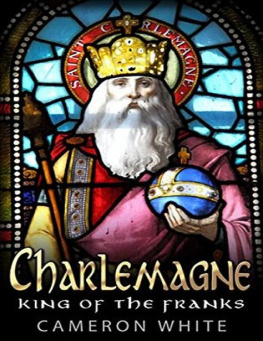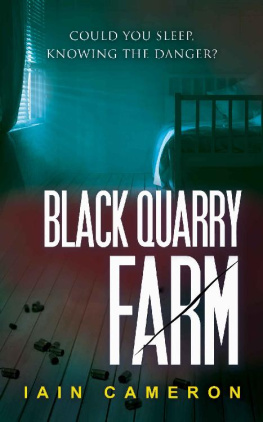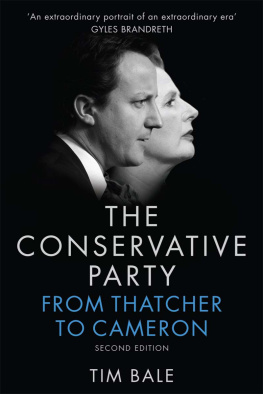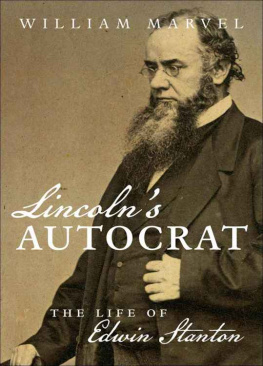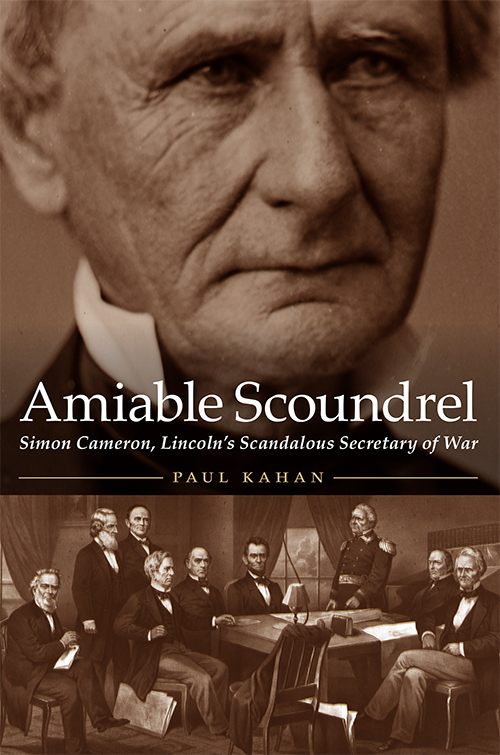
This book goes behind Camerons reputation for shady dealing and demonstrates that as a senator, ambassador, secretary of war, and political boss he advanced important policy achievements, including the abolition of slavery and equal constitutional rights for freed slaves.
James M. Mcpherson, author of the Pulitzer Prizewinning Battle Cry of Freedom and The War That Forged a Nation
Paul Kahan has given us a solid, readable, balanced biography of Simon Cameron, Lincolns first secretary of war and one of the great, if controversial, politicians of his generation.
Walter Stahr, author of Seward: Lincolns Indispensable Man and John Jay: Founding Father
This is a much-needed cradle-to-grave biography of one of Lincolns most important, and most maligned, early cabinet officers. Kahan peels away the stereotypes and myths to paint the kind of complex portrait this undyingly loyal Lincoln man deserves.
Harold Holzer, director of the Roosevelt House Public Policy Institute at Hunter College and author of Lincoln and the Power of the Press, winner of the Gilder-Lehrman Lincoln Prize
Amiable Scoundrel
Amiable Scoundrel
Simon Cameron, Lincolns Scandalous Secretary of War
Paul Kahan
Potomac Books
An imprint of the University of Nebraska Press
2016 by the Board of Regents of the University of Nebraska
Cover images: top photo courtesy Library of Congress Prints and Photographs Division, LC - DIG -cwpbh-00731; bottom photo courtesy Library of Congress Prints and Photographs Division, LC - DIG -pga-01778
All rights reserved. Potomac Books is an imprint of the University of Nebraska Press.
Library of Congress Cataloging-in-Publication Data
Names: Kahan, Paul, author.
Title: Amiable scoundrel: Simon Cameron, Lincolns scandalous Secretary of War / Paul Kahan.
Description: Lincoln: Potomac Books, An imprint of the University of Nebraska Press, 2016. | Includes bibliographical references and index.
Identifiers: LCCN 2016005061
ISBN 9781612348148 (cloth: alk. paper)
ISBN 9781612348476 (epub)
ISBN 9781612348483 (mobi)
ISBN 9781612348490 (pdf)
Subjects: LCSH : Cameron, Simon, 17991889. | Cabinet officersUnited StatesBiography. | LegislatorsUnited StatesBiography. | United StatesPolitics and government18491877. | United StatesPolitics and government18611865. | Lincoln, Abraham, 18091865Friends and associates. | Maytown (Lancaster County, Pa.)Biography.
Classification: LCC E 415.9. C 18 K 34 2016 | DDC 973.7092dc23
LC record available at http://lccn.loc.gov/2016005061
The publisher does not have any control over and does not assume any responsibility for author or third-party websites or their content.
To Jen, Alec, and Zoethanks for everything
Contents
Projects like Amiable Scoundrel reflect the assistance of dozens, if not hundreds, of people whose names do not appear on the cover, so I want to take a moment and thank them. Ashley Cataldo at the American Antiquarian Society, Beth Huffer at the Gilder Lehrman Institute of American History, Amanda Dean at the Historical Society of Pennsylvania, Debbie Hamm at the Abraham Lincoln Presidential Library Foundation, Mitch Fraas at the University of Pennsylvania Library, and Janet Mulligan Bowen at the Dauphin County Historical Society all took the time to track down various documents in their respective collections and send me digital copies. Stephanie Hoover provided invaluable assistance as a long-distance researcher, meticulously combing through various collections at the Pennsylvania State Archives and sending me digital copies of relevant documents. At the University of Nebraska Press, Kristen Elias Rowley (ably assisted by Emily Wendell) helped trim and shape the manuscript, while my friends Karen Momarella, Will Holbert, and Brian Dixon all read and commented on the book at various stages. My sister-in-law Tara Murphy proofread the manuscript, tirelessly crossing every t and dotting every i. Undoubtedly, Amiable Scoundrel is a much better book because of their help. Lastly, I want to thank my wife, Jennifer, and our children, Alec and Zoe, all of whom picked up the slack around the house so that I could have the time to write. Amiable Scoundrel is dedicated to them.
Warm Friends and Bitter Enemies
His contemporaries called him the greatest of wire-pullers and corrupt as a dunghill.
Camerons career highlights three key themes about American political life during the nineteenth century. First is the centrality of the spoils system to accruing and consolidating political power in nineteenth-century America. Second is the
The third theme is the fluidity of political identity until the Civil War. Historians have often cited Camerons migration from the Democratic Party to the Know-Nothing and then finally the Republican Party as proof of opportunism and lack of principle. In truth, the key to understanding Camerons long career is that he was, first and foremost, a protector of Pennsylvanias business interests. Seen through this lens, his migration from the Democratic Party to the Know-Nothing and then finally the Republican Party can best be understood as an attempt to forward and protect Pennsylvanias interests as he perceived them.
Moreover, despite his reputation as a craven and unprincipled scoundrel willing to do or say anything to win an election, Camerons trademark virtues were loyalty and generosity. Gideon Welles, who served as Lincolns secretary of the navy and disliked Cameron personally, nevertheless recalled no man was more faithful to true and abiding friends than Simon Cameron. He never abandoned or neglected to serve if he had the opportunity those who had supported him.former Confederates as his friends. Generous to his friendsand even to complete strangershe was a devoted family man who passionately loved his wife and children.
At the same time, Cameron had an acerbic wit and was combative to people he perceived as enemies, seeing political conflict as a form of take-no-prisoners warfare. Thurlow Weed, the influential newspaper publisher, noted that, Mr. Cameron during a long and stirring political life had made warm friends and bitter enemies.
Amiable Scoundrels most surprising revelation is that Cameron had rather progressive attitudes on race. Though historians have noted the fact that Lincoln forced Cameron out of the cabinet over the latters recommendation that the government enlist slaves, many have argued that this was a smokescreen covering the real reason the president wanted to remove Cameron (corruption). Others have argued that Camerons recommendation was a cynical attempt to ingratiate himself to congressional abolitionists, and thereby prevent Lincoln from firing him. Both explanations miss the mark; in reality, from the moment he became secretary of war, Cameron argued that attacking slavery was essential to winning the war. Though as a senator he had been a conservative on the issue of slavery, arguing that the federal government had no power to regulate it in states where it already existed, as a private citizen he paid to educate at least one escaped slave and, after the war, he used his political influence to improve conditions for former slaves. Put another way, there is substantial evidence to suggest that while Cameron may have used corrupt means to achieve political power and wealth, he frequently used both to further positive social change.
The point here, then, is not to defend Camerons actions, many of which will strike modern readers as unprincipled, unscrupulous, and corrupt. Instead,

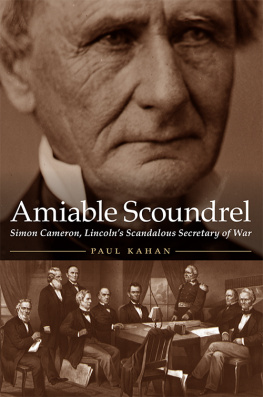
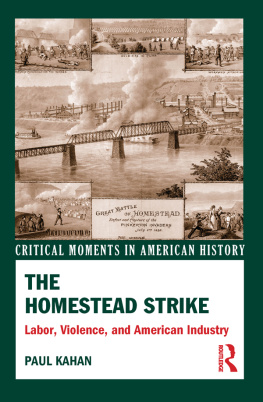

![Paul Kahan - Cooking for Good Times: Super Delicious, Super Simple [A Cookbook]](/uploads/posts/book/150685/thumbs/paul-kahan-cooking-for-good-times-super.jpg)




